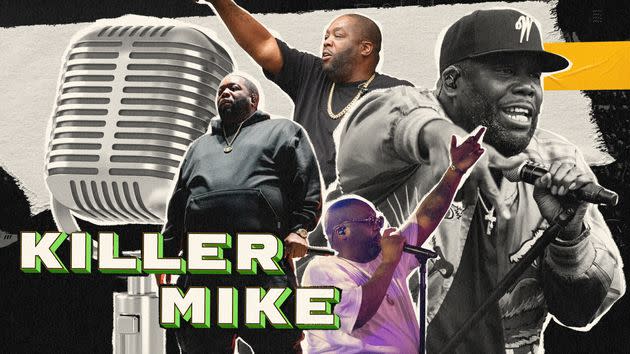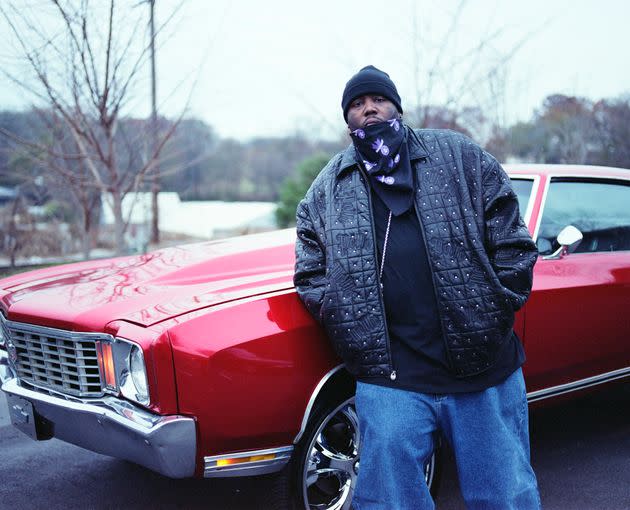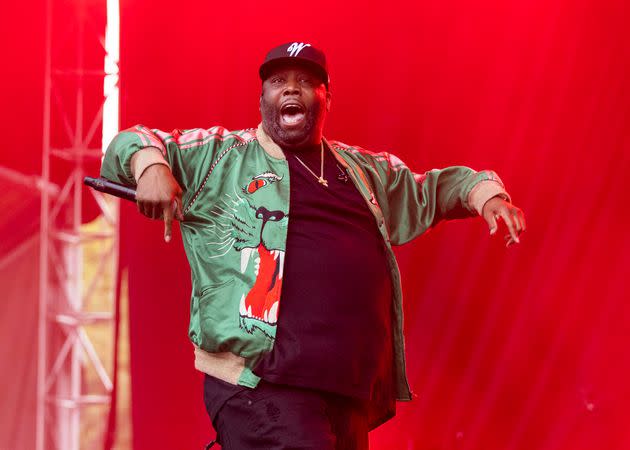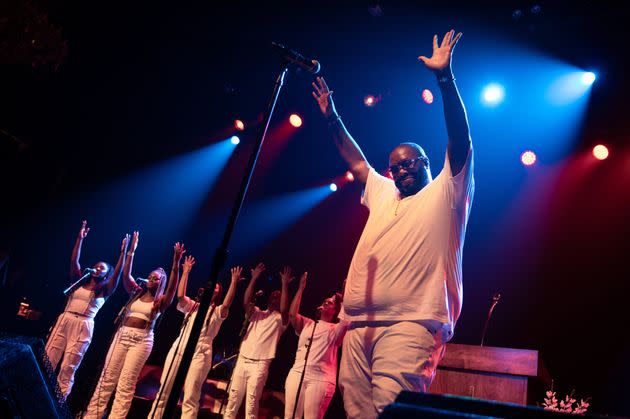Killer Mike Finally Realizes Who He Is — And His Latest Album Is His Most Personal Yet
- Oops!Something went wrong.Please try again later.
- Oops!Something went wrong.Please try again later.

Illustration: Benjamin Currie/HuffPost; Photos: Getty Images
Killer Mike Finally Realizes Who He Is — And His Latest Album Is His Most Personal Yet
The Atlanta rapper took his fans on a spiritual journey on his album “Michael” and crafted his summer tour like a revival at a Southern church.
By William E. Ketchum III
Aug. 10, 2023
When it comes to hip-hop, many of the genre’s most iconic artists are known to use their debut album to tell their life story. Notorious B.I.G.’s “Ready To Die” featured a baby picture of himself on the cover and told his story of growing up poor in Brooklyn and slanging drugs to get by before finding superstardom in rap. Kendrick Lamar’s “good kid, m.A.A.d city” told the tale of how a Compton kid bobbed and weaved his way through Los Angeles’ gang culture before embracing religion as a saving grace.
Those early albums are essential, because they help build an identity that fans will connect with for the rest of those artists’ careers.
But Killer Mike didn’t release his most personal album, “Michael,” until 20 years after his debut. And so far, it appears to be his best-received solo album yet.
“Man, I wasn’t who I was earlier,” Killer Mike tells HuffPost on a Zoom call, before giving a quick run-through of his 20-year career, with a little bit of life spliced in between. “You [finally realize], ‘You still ain’t told your story, Fat Boy. They still don’t understand who you are, because you didn’t understand who you were.’”
For much of Michael Render’s life, he’s had a vested interest in being a part of something larger than himself. He made his debut on Outkast’s famed “Stankonia” album, appearing on their song “The Whole World” and eventually signing on to their label Purple Ribbon Records (along with future star Janelle Monáe). In 2012, he released an album called “R.A.P. Music” with New York rapper and producer El-P before they formed Run the Jewels, an act that’s arguably on the road to becoming one of the best rap groups ever.
That doesn’t mean Killer Mike didn’t have his own set of goals and aspirations; it just took awhile for them to sharpen into focus. He refers to his 2003 solo debut “Monster” as his “imperfect classic” — Outkast had signed him after Big Boi’s little brother introduced him to Mike’s music, and he was desperate for that album to be his escape from a life of “rolling” (an Atlanta term for drug dealing that predated the newer term of “trapping”).
“I was just trying to not be a dope boy and die a dope man,” he remembers. “Whatever it took. If I had to make a crunk song then I’d make a crunk song, whatever.”

Killer Mike in Atlanta in 2005. (Gregory Bojorquez/Getty Images)
But he wanted to be taken seriously as a lyricist, and he had the bars that deserved it. His “I Pledge Allegiance to the Grind” mixtape series is part motivational credo and part Southern rap ode, pushing himself and his listeners to chase their dreams in spite of a corrupt, oppressive web of politicians, laws and historic precedence that wants to see them fail.
But over the past decade, his success has begun to pay off. Run the Jewels has become one of the most successful acts in the business, earning persistent critical acclaim and a loyal, unwavering fan base that fills its constant tour schedule and gobbles up all of its merch. Mike owns a collection of barbershops in Atlanta, co-founded an online financial platform called Greenwood that is focused on supporting Black-owned businesses, and hosted a 2019 Netflix docuseries called “Trigger Warning With Killer Mike.” He’s also become a prominent political voice in both local and national terms, joining Bernie Sanders on the presidential campaign trail in 2015 and maintaining that prominence in the years since.
"To be honest, when you’re as big as me and you as Black as us, people don’t think much of you — and what they do think of you is usually utilitarian. I was just a kid existing in this world. In my opinion, I needed to show the human being, because I feel like there are more of us out there."
But in 2020, he realized that, despite all of this success, he still hadn’t told his own story. He began to recognize the culmination of these experiences during a nasty bout with COVID-19. Having some time to sit down and think after believing he was going to die, he says, allowed him to get some perspective on his life. He describes seeing different variations of Black life growing up in Atlanta, attending a school named after Frederick Douglass, selling weed as a student at Morehouse College, and everything in between.
“I didn’t understand how interestingly unique my life was, and how regular and common at the same time. I walked this weird parallel line,” Mike says. “I just think that there’s something to be said for a child who is as influenced by N.W.A as he is James Baldwin. A child who understands Zora Neale Hurston because she wrote like his grandparents spoke. That understands the conundrum that is the working-class man in the August Wilson play “Fences” because he sees his grandfather be a noble working-class man.
“To be honest, when you’re as big as me and you as Black as us, people don’t think much of you — and what they do think of you is usually utilitarian,” he continues. “You’re security, you’re the bellman, you’re the busboy. Or they are super impressed that you know anything and they talk with ‘Oh, he went to,’ ‘He attended,’ ‘He’s a member of.’ I was just a kid existing in this world. In my opinion, I needed to show the human being, because I feel like there are more of us out there.”

Killer Mike performs on Day 1 of the 10th anniversary of the Shaky Knees Festival in Central Park in Atlanta. (Scott Legato/Getty Images)
“Michael” is his biggest chance ever to dive into his personal background and heritage. The track “Slummer” finds him remorseful after a puppy love romance turns into an unplanned pregnancy, and “Somethin for Junkies” attempts to humanize the people he sold drugs to (including his own family members). “Shed Tears” seeks spiritual solace as he fights depression and suicidal ideation over difficulties with his child’s mother, and “Motherless” is a tearful acceptance of the deaths of his mother and grandmother. The latter, he says, was a result of executive producer No I.D. — who has worked with Common, Jay-Z and Ye — pushing him to his limits: he and Little Rock, Arkansas, rapper and singer Cuz Lightyear had already put together a fair amount of the album, but No I.D. knew something was missing. He compares No I.D. to a member of the Nation of Islam who used to stand on the corner during his adolescence and asked him and his high school classmates questions to open their minds.
“He said, ‘What are you really afraid of?’ I’m thinking to myself, ‘This nigga just saying some shit to fuck with me.’ But I said I already faced my greatest fear: My girls are gone. My grandmother Betty died, and my momma died. I didn’t say they died, I said they’re gone. He said, ‘Well that’s it. That’s what we’re gonna talk about,’” he recalls. “I gave every excuse I could. I didn’t want to face the first four words of that song because I had never said them. I’ve said that my mother is transitioning, and going to the ancestors. I’ve said everything you can say. … That’s what a friend, a good producer and executive producer does. They pull the best out of you.”
"I’m a rapping-ass motherfucker, and we give one hell of a rap show. And this is not a rap show. This is a spiritual experience. This is a blues and gospel, funk and soul, rap show."
But his story isn’t just a matter of personal recollections; it’s also a collection of sounds and environments. The track “Scientists & Engineers” finds three generations of Atlanta’s Dungeon Family making magic together as Mike, Andre 3000 and Future each take on a synthy dream of a beat in their unique styles, and “Talk’n That Shit” finds him tearing apart a beat by DJ Paul — just two examples of how the album firmly stands in Mike’s geographical and cultural heritage through its use of Southern rap staples (808s, synths) and church sounds (organs, choirs).
An assortment of new and old Atlanta stars (6LACK, Young Thug, 2 Chainz, Fabo of the group D4L, Jagged Edge, CeeLo) show up to help, along with out-of-towners like Ty Dolla $ign and Curren$y. Mike continued the religious foundation of the album live, bringing a choir on tour with him to serve as background singers and dancers on his Michael tour for a show steeped in soul, spirituality and wide-ranging emotions.
It’s a big change from his Run the Jewels presentation, which brings chaotic, relentless energy from start to finish. On “NRICH,” he pointedly raps, “I know you like me running the jewels, but these my nigga flows” — and that’s exactly what attendees of Killer Mike’s tour got. His goal, he says, was to make the tour like a revival at a Southern church.
“You know I do that hip-hop shit. I’m a rapping-ass motherfucker, and we give one hell of a rap show. And this is not a rap show. This is a spiritual experience. This is a blues and gospel, funk and soul, rap show. These are country rap tunes put on display,” he tells HuffPost. “A revival comes through town, and it’s like a show. The best preacher that preach gonna be there. All the pretty girls who momma a real Christian gonna be there. They’re gonna be there in their street clothes, not the church clothes. You might just see some biker shorts at the revival. The pastor gonna be sweaty. The music is gonna be so good that you’re gonna leave feeling uplifted.”
Killer Mike’s album also finds him speaking about the same sociopolitical issues that he has in the past, as “Two Days” addresses the prison industrial complex and “Down by Law” calls for the freedom of some named Black politicians, former gang leaders and activists, and honors the lives and deaths of others.
A formative memory from his childhood is his grandmother dragging him to city council meetings and neighborhood meetings when he was as young as 5 years old, a predecessor to the sociopolitical music, activism and community involvement that would become such a marker for his career later.
“My grandmother would take me and have me sit there like Celie in ‘The Color Purple’ just watching shit go down,” he recalls. “So as this happens, I asked her, ‘Why do you do this?’ She says, ‘Because this is what you’re supposed to do. You’re supposed to help your neighbor.’ That never left me.”
But his politics have been a source of ire in recent years. Some of his critics have felt he has lost his way since becoming rich and that meetings with conservatives like Georgia Gov. Brian Kemp and former U.S. Senate candidate Herschel Walker are more harmful than helpful. Mike says he intentionally focuses his political involvement on the community in Atlanta, even though he gets a national spotlight because of his celebrity and his involvement in Sanders’ national campaign.
“If you were local in Atlanta, you were used to seeing me take people to the polls; you were used to that because I’ve never not done it. OK, a bigger light pops up, but I’m not gonna stop telling the truth. … If you listen to ‘Pledge II,’ then it’s still music first for you. But if you discovered me via Bernie, you may want me to be your Jane Fonda and I’m not her,” he says.
He compares himself to Ernie Barnes, a former professional athlete who was also a respected painter and sculptor.
“People got mad that I didn’t publicly support their candidate. But they forget the ones I did publicly support, then they’ll lie and say I did publicly support someone else,” Mike says. “I’m going to put out dope art and if my art strikes you, it strikes you, but I’m not a politician’s tool.”
When asked about the “Cop City” controversy — a training center for police and firefighters that’s set to take up over 85 acres in central Atlanta and cost $90 million — he laments the need for the community advisory board to get back the strength he says it had under former Mayor Kasim Reed. He also says it’s important to help people like former U.S. Rep. Cynthia McKinney of Georgia and Atlanta Citizen Review Board outreach specialist Charles Curry. While he doesn’t hesitate to speak his mind about political issues, he emphasized that he wants to focus resources and amplification for the people who are doing the work in those areas.

Killer Mike performs at The Fillmore in July in San Francisco. (Dana Jacobs/Getty Images)
“I’d rather support organizations that are doing the right thing in the community, like Next Level Boys Academy, Georgia YouthBuild, they do the work. Give to them, don’t give me nothing,” he says. “I get paid for singing and dancing to people. I’m just doing what my grandmother told me was the right thing to do, and that’s just taking care of Atlanta. … Give me $6 million and watch what the fuck I do. I’m gonna give it directly to who’s doing the work.”
Musically, Killer Mike is as focused as ever. With his Killer Mike and the Midnight Revival Tour almost finished, he’s about to hunker down to memorize his Run the Jewels material for an upcoming RTJ tour that’ll find him and his partner performing their crew’s best.
“El-P had a measure of fame and success via [the label he founded] Def Jux, but I had never gotten my just due. I think that Run the Jewels gave us both our just due and beyond. So being a part of a supergroup — Run DMC made me want to do it; the Fat Boys made me want to do it,” Mike says. “Everything big starts with just something small. And to me, Michael, the 9-year-old boy, small, little chubby face kid before he gets the scar on his face, is the small thing whose imagination is even bigger than what he’s done now.”
This story is part of a HuffPost series celebrating the 50th anniversary of hip-hop. See all of our coverage here.
